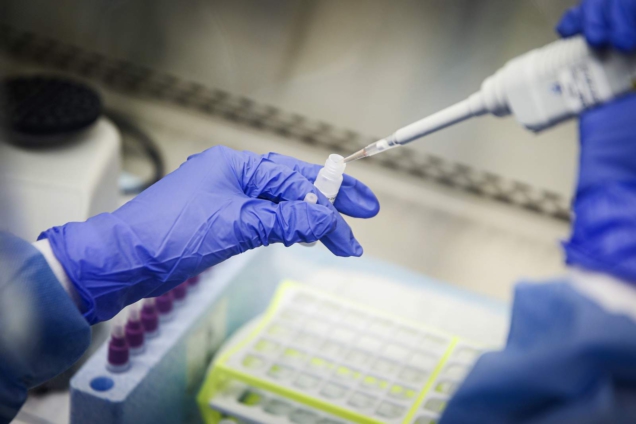In what is clearly a triumph for academic and industry synergy, a rapid diagnostic test kit for the new coronavirus has been developed in Ghana.
Scientists at the Kwame Nkrumah University of Science and Technology (KNUST) and Incas Diagnostics, both based in the Ashanti Region capital, Kumasi, are currently optimising the kit for Covid-19 testing.
Scientists from the Kumasi Centre for Collaborative Research (KCCR), one of the major testing centres for Covid-19 in Ghana, made significant inputs into the development.
The new RDT kit for Covid-19 is a boost for Ghana’s efforts at holding the disease that has – at the last count – claimed 11 lives and puts the life of some 1,550 at risk because it is consistent with the government’s strategy to dealing with the pandemic: contain the spread, inspire the expansion of domestic capability and deepen self-reliance.
The KNUST-Incas Diagnostic technology uses a finger-prick blood – just like blood glucose test or home pregnancy test – to detect two different types of antibodies produced by the body when it is fighting off Covid-19 infection at least seven days after infection – whether the person is showing symptoms or not.
This is a major breakthrough because, while the world waits for a vaccine, virologists are unanimous in their admonishment that widespread testing remains a key strategy to 'flatten the curve' of the pandemic anywhere.
Different technology
The researchers at the two collaborating institutions explain that the current method of testing for Covid-19 in Ghana (from Polymerase Chain Reaction or PCR) detects parts of the viral genome very early in infection and takes at least 48 hours from testing to results.
Although this method of testing is impressive and used in many other parts of the world, it can delay contact tracing and other efforts in the fight against the virus.
The PCR tests are also, unable to identify people who have been infected (symptomatic or asymptomatic) and recovered.
However, the KNUST-Incas Diagnostic kit detects asymptomatic cases, enables decentralised testing to be done anywhere without requiring any equipment

“The device also requires little technical training for those performing the test,” Dr Daniel Norris Bekoe, University Relations Officer at KNUST, explains in a press release.
He said the test takes 15 to 20 minutes to perform and will enable people anxious to know the status get their results in a shorter time to enable decision making in real-time.
“A key use of this RDT would be for mass testing of the population to identify all those who have been exposed to the virus and thus provide key data for efforts to model the course of the pandemic and also, enhance contact tracing efforts.
“By indicating how much of the population is already likely immune because of mild infections, antibody data can offer a key to how fast the virus will continue to spread,” Dr Bekoe explained the importance of the breakthrough.
But that is not all.
In the future, the homegrown technology could also help health officers to identify recovered patients who could then donate their SARS-CoV-2 antibody-rich serum for the treatment of critically ill patients as is being done in some countries.
“Another key application would be to identify frontline health workers who have been infected and developed likely immunity to the virus. They would then be able to return to work early and treat patients safely,” Dr Bekoe detailed even more applications of the technology.
He said for researchers in the country, the antibody tests would enable the study of the dynamics of immune responses of infected people.
“As the country intends partnering and supporting Covid-19 vaccine development, the antibody tests would be invaluable in determining individual and community responses to the vaccine,” the KNUST University Relations Officer stated.
Approval
KNUST and Incas Diagnostics say throughout the development, they have been in touch with the Ministry of Health and the National Covid-19 Response Team.
The developers are currently engaging the Food and Drug Authority (FDA) for the necessary regulatory framework.
The breakthrough was achieved with the support from Vice-Chancellor of KNUST, Professor Kwasi Obiri-Danso the Centre for Advanced Rapid Diagnostics, Mologic, UK, Mastercard Foundation through the Ghana Tech Lab, the Ghana Association of Medical Laboratory Scientists and Dext Technologies, Kumasi.
Latest Stories
-
Dr Nduom hopeful defunct GN bank will be restored under Mahama administration
30 minutes -
Bridget Bonnie celebrates NDC Victory, champions hope for women and youth
38 minutes -
Shamima Muslim urges youth to lead Ghana’s renewal at 18Plus4NDC anniversary
2 hours -
Akufo-Addo condemns post-election violence, blames NDC
2 hours -
DAMC, Free Food Company, to distribute 10,000 packs of food to street kids
3 hours -
Kwame Boafo Akuffo: Court ruling on re-collation flawed
3 hours -
Samuel Yaw Adusei: The strategist behind NDC’s electoral security in Ashanti region
3 hours -
I’m confident posterity will judge my performance well – Akufo-Addo
4 hours -
Syria’s minorities seek security as country charts new future
4 hours -
Prof. Nana Aba Appiah Amfo re-appointed as Vice-Chancellor of the University of Ghana
4 hours -
German police probe market attack security and warnings
4 hours -
Grief and anger in Magdeburg after Christmas market attack
4 hours -
Baltasar Coin becomes first Ghanaian meme coin to hit DEX Screener at $100K market cap
5 hours -
EC blames re-collation of disputed results on widespread lawlessness by party supporters
5 hours -
Top 20 Ghanaian songs released in 2024
6 hours

